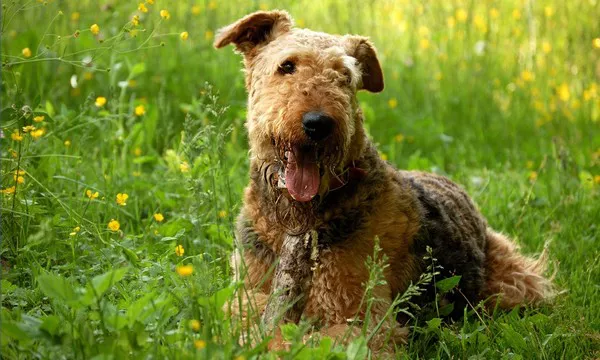Biting is a common behavior in puppies, including Airedale Terriers, and it’s often a result of natural instincts and teething. Puppies explore the world with their mouths, and this can lead to nipping and biting. Understanding the reasons behind this behavior is the first step in curbing it.
The Importance of Socialization
Socialization plays a crucial role in a puppy’s development. Proper socialization helps puppies learn appropriate behaviors, including controlling their bite. Puppies that are well-socialized are less likely to exhibit aggressive biting tendencies.
Play Behavior and Bite Inhibition
Puppies often bite during play. It’s a natural part of their play behavior and helps them learn bite inhibition. Bite inhibition is the ability to control the force of their bite, which is essential for preventing accidental injuries.
Training Techniques to Stop Biting
Consistency is Key
Consistency in training is vital. All family members and anyone interacting with the puppy should follow the same rules and training methods. Mixed signals can confuse the puppy and make training less effective.
Positive Reinforcement
Positive reinforcement is an effective training method. Rewarding the puppy for good behavior with treats, praise, or playtime encourages them to repeat the desired behavior. Avoid using punishment, as it can lead to fear and aggression.
Redirecting the Bite
When the puppy starts to bite, redirect their attention to a toy or chewable item. This teaches them what is appropriate to bite. Consistently offering a toy when they bite helps them understand that toys are for biting, not hands or feet.
Teaching “No” and “Off”
Teaching commands like “no” and “off” can be beneficial. When the puppy bites, say “no” firmly but calmly, then offer an acceptable alternative like a toy. Use “off” to signal them to stop biting or nipping.
Socializing with Other Puppies
Allowing the puppy to play with other puppies can help them learn bite inhibition. Puppies teach each other how hard is too hard when it comes to biting. Supervised playdates can be an excellent opportunity for this learning.
Addressing Teething
Providing Appropriate Chew Toys
During teething, puppies need to chew. Provide a variety of safe chew toys to soothe their gums and satisfy their need to chew. Rotate the toys to keep the puppy interested.
Cold Items for Teething Relief
Cold items can provide relief for teething puppies. Offer cold, wet washcloths or specially designed teething toys that can be chilled. These can help numb the gums and reduce discomfort.
Behavioral Training Tips
Avoiding Rough Play
Avoid playing rough games like tug-of-war or wrestling with the puppy, as these can encourage biting. Instead, engage in gentle play and games that don’t involve using your hands as targets.
Establishing Boundaries
Establish clear boundaries for acceptable behavior. If the puppy bites, end playtime immediately. This teaches them that biting results in the end of fun activities.
Using Time-Outs
If the puppy continues to bite despite redirection, use a time-out. Place them in a safe, quiet area for a few minutes to calm down. This helps them understand that biting leads to a loss of interaction.
Understanding the Airedale Terrier’s Temperament
Energetic and Intelligent Breed
Airedale Terriers are known for their energy and intelligence. They require mental and physical stimulation to prevent boredom, which can lead to unwanted behaviors like biting.
Providing Adequate Exercise
Ensure the puppy gets plenty of exercise. Regular walks, playtime, and training sessions help burn off excess energy and keep the puppy mentally stimulated.
Mental Stimulation Activities
Incorporate activities that challenge the puppy’s mind. Puzzle toys, training exercises, and interactive games can keep them engaged and reduce the likelihood of biting out of boredom.
Building a Strong Bond
Positive Interactions
Build a strong bond with the puppy through positive interactions. Spend quality time together, engage in training sessions, and provide affection and praise.
Understanding and Patience
Understand that training takes time and patience. Puppies, like Airedale Terriers, are learning and need consistent guidance and positive reinforcement to develop good habits.
Seeking Professional Help
Consulting a Veterinarian
If the biting behavior persists or escalates, consult a veterinarian. They can rule out any underlying medical issues that might be causing the behavior and provide additional guidance.
Hiring a Professional Trainer
A professional dog trainer can offer specialized training techniques and personalized guidance. They can help address specific issues and tailor the training to the puppy’s needs.
See also: How Easy Is It to Train a Cocker Spaniel
Conclusion
Stopping an Airedale Terrier puppy from biting requires understanding, patience, and consistent training. By using positive reinforcement, providing appropriate chew toys, and ensuring proper socialization, you can help your puppy develop good habits and reduce biting behavior. Remember, every puppy is unique, and it may take time to see significant changes. Stay committed to the training process, and you’ll foster a well-behaved and happy Airedale Terrier.


